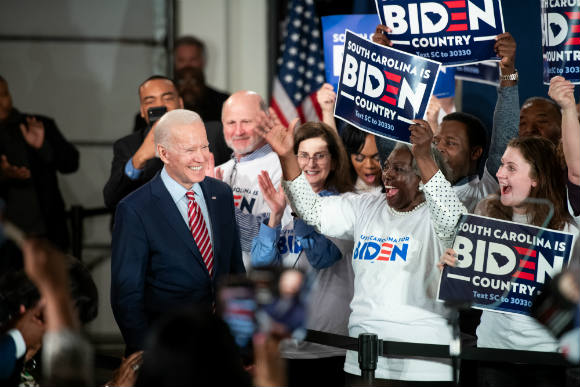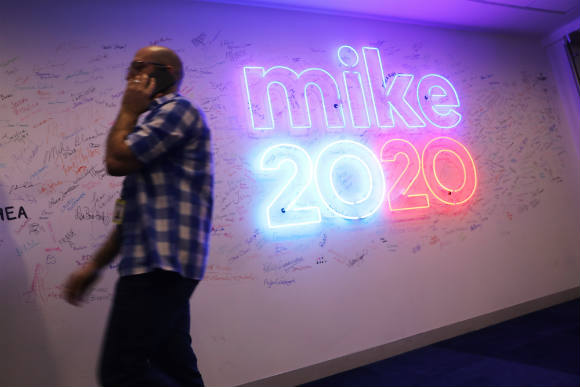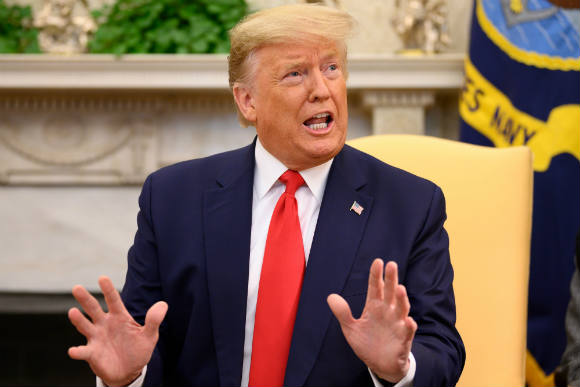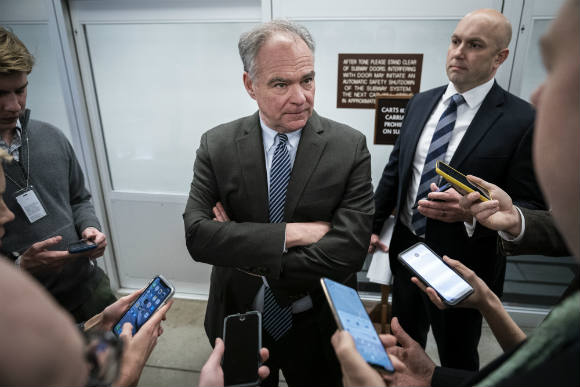The Hill’s Morning Report – Sanders surge triggers Dem angst


Welcome to The Hill’s Morning Report. Happy Thursday! Our newsletter gets you up to speed on the most important developments in politics and policy, plus trends to watch. Alexis Simendinger and Al Weaver are the daily co-creators, so find us @asimendinger and @alweaver22 on Twitter and recommend the Morning Report to your friends. CLICK HERE to subscribe!
With two disappointing finishes behind him, former Vice President Joe Biden is facing a crucial stretch, headlined by the South Carolina primary on Feb. 29, that could make or break his chances to take home the Democratic nomination.
Biden, once the Democratic frontrunner, has posted fourth- and fifth-place finishes in Iowa and New Hampshire, respectively, and has supporters trying to keep the faith and remain optimistic about his chances. However, one key bloc of supporters has grown nervous since voting has kicked off: Senate Democrats.
With Biden’s stumbles and the rise of Sen. Bernie Sanders (I-Vt.) to frontrunner status, some of Sanders’s own colleagues are feeling queasy about their party’s presidential primary and worry that nominating the self-identified democratic socialist poses risks for the party in November, as Alexander Bolton reports.
Senate Democrats and some House colleagues have been careful not to criticize Sanders publicly, but they have serious questions about the electability of the Vermont senator and the potential issues he could inject into down-ballot contests for vulnerable Senate candidates. Several of Sanders’s signature proposals, such as “Medicare for All,” free college, cancellation of student debt and a sweeping Green New Deal, do not have the backing of a majority of Democratic senators.
“I think there’s a substantial element of people worried about where we’re going,” said a Democratic senator on the condition of anonymity. Asked about Sanders’s far-left reputation, the lawmaker added, “Senators worry about that.”
The Washington Post: Usually the early Democratic presidential contests shrink the field. This year, they’ve expanded it.
The New York Times: Centrist Democrats want to stop Sanders. They’re not sure who can.
With the battle for Nevada in full swing, the Culinary Union fired an initial salvo on Wednesday, panning Sanders’s supporters for their repeated attacks against the union for its opposition to Medicare for All (The Hill).
The union, which covers the health insurance of 130,000 workers and their dependents, was on the receiving end of attacks from the Vermont Independent’s supporters after it circulated a flyer saying that his health care proposal would “end Culinary Healthcare.” Overall, the union represents 60,000 workers across Las Vegas and Reno, Nev.
Nevada and South Carolina pose new challenges for leading presidential candidates as they try to make inroads with African American and Hispanic voters.
As Rafael Bernal and Amie Parnes report, former South Bend, Ind. Mayor Pete Buttigieg and Sen. Amy Klobuchar (D-Minn.) will likely be forced to fine-tune their messages in two distinctly different states as they appeal to a more diverse array of voters and prepare for the 14-state political endurance test that is Super Tuesday on March 3.
More than a quarter of South Carolinians are African American, for example, while 29 percent of Nevadans are Hispanic. While South Carolina’s unemployment rate is below the nation as a whole, the unemployment rate for blacks is nearly twice what it is for whites in the state. Nevada has rebounded from the economic apocalypse that followed the 2008 financial crisis, but Latinos have a higher jobless rate than the state as a whole.
“We go from the Butter Cow and small diners of Iowa and New Hampshire to the taco stands and church pews of Nevada and South Carolina,” said Democratic strategist Michael Trujillo. “While the issues of education, health care and immigration are important in these two upcoming states, it requires being able to convey your message with a church choir behind you and translation headphones worn by audience members.”
According to the RealClearPolitics average of polls, neither candidate cracks double-digit support levels in either of the two states. With only 10 days to campaign before Nevada, the compact nature of the schedule could present issues for the campaigns as they try to capitalize on momentum and increase candidates’ name-ID in the next two states.
Some campaigns are also shrinking investments in the two contests, including Sen. Elizabeth Warren (D-Mass.) as she cancelled $1.2 million of ads (ABC News).
The Washington Post: Warren’s campaign at a crossroads as once-rising star confronts disappointing finishes.
The Hill: Where 2020 candidates stand in Super Tuesday polls.
The Hill: Rep. Joe Cunningham (D-S.C.) blasts Sanders: “South Carolinians don’t want socialism.”
The Associated Press: Some Democrats fear fallout from Sanders atop the ticket.
As the schedule turns, so does the focus on former New York City Mayor Michael Bloomberg as he prepares to plant his flag in the race on Super Tuesday and continues to pick up support from key allies. Even as he remained embroiled in a public relations spat over his “stop-and-frisk” policy that he only recently disavowed, three members of the Congressional Black Caucus — Reps. Lucy McBath (D-Ga.), Gregory Meeks (D-N.Y.) and Del. Stacey Plaskett (D-Virgin Islands) — endorsed his campaign, giving him a needed boost (CNN).
The former mayor, however, continues to plow toward March 3. His campaign has spent $1 million a day on Facebook ads in the past two weeks, and remains a constant presence on the airwaves with a steady stream of TV ads (The Hill).
Jonathan Allen: Bloomberg storms to the center of the 2020 presidential fray.
The Hill: MoveOn blasts Bloomberg’s “false” account of stop and frisk.
The Hill: Iowa Democratic Party chairman resigns following caucuses debacle.
In non-Democratic primary news, the president announced endorsements of seven GOP House candidates on Wednesday night in a number of potential key races, including in Texas and New York. The House GOP needs to win back 18 seats in November to retake the majority.

LEADING THE DAY
WHITE HOUSE & ADMINISTRATION: Trump on Wednesday denied he intervened with the Justice Department to secure a lighter recommended punishment for his longtime friend and political ally Roger Stone. But his assertions that he maintained a hands-off approach to Stone’s case served to confirm the president’s seething focus on what he sees as “unfair” federal prosecutions that grew out of former special counsel Robert Mueller’s investigation of alleged collaboration between Trump’s 2016 campaign and foreign interference to tilt the election.
Asked if he plans to pardon Stone, 67, a dirty trickster for former President Nixon (The New Yorker), Trump suggested he’s given the clemency option some thought. “I don’t want to say that yet, but I tell you what, people were hurt viciously and badly by these corrupt people,” he said (The New York Times).
He argued that lawyers at the Justice Department should “apologize” to Stone for initially trying to lock him up for seven to nine years. That recommendation was made to the court on Monday but walked back by department higher-ups shortly after Trump tweeted his protests overnight on Tuesday. A department spokeswoman said the timing was coincidental.
Stone faces criminal sentencing later this month after a jury found him guilty on seven counts of lying to Congress, witness tampering and obstruction. Witness tampering can carry a maximum penalty of 20 years in prison.
The controversy inside the Justice Department prompted a career prosecutor to resign from the administration, while three others withdrew from Stone’s case. Trump also decided this week to pull back the nomination of a fifth attorney who worked on Stone’s prosecution and who had been poised for a Senate confirmation hearing today for a Treasury post.

The unusual series of events ignited a political firestorm that has ensnared Attorney General William Barr, who is cast by the president’s critics as Trump’s enabler and fixer (The Hill).
Members of the House and Senate in both parties have been drawn into a debate about whether Congress should respond and how. There is no law that bars the president from opining about cases at the Justice Department, although many of Trump’s predecessors have been sensitive to criticism about layering politics on top of Justice’s decision making. Examples include former President George W. Bush’s decision to fire seven U.S. attorneys in 2006, and former Attorney General Loretta Lynch’s decision to hold a private chat with former President Clinton aboard her plane while his wife, Hillary Clinton, was running for president.
Barr on Wednesday agreed to testify March 13 before the House Judiciary Committee — the same panel that worked to impeach Trump. Committee members told the attorney general they want to ask him about alleged politicization at the department (The Hill).
Republican senators, fresh off a two-week trial that resulted in Trump’s acquittal, were quick on Wednesday to observe that the president remains under public scrutiny (The Hill). Sen. Lisa Murkowski (R-Alaska), who voted to acquit Trump on two articles of impeachment, said “I don’t like this chain of events. … I think most people in America would look at that and say, `Hmmm, that just doesn’t look right.’ ”
The Washington Post: Republicans are ready to look past Trump’s brash intervention in the Roger Stone case.
Senate Minority Leader Charles Schumer (D-N.Y.) and his Democratic colleagues want an “emergency” hearing about the turmoil inside the Justice Department. And Sen. Elizabeth Warren (D-Mass.), who is campaigning for the presidency after coming in fourth in the New Hampshire primary on Tuesday, renewed her calls for Barr’s resignation (The Hill).
Former Massachusetts Gov. William Weld (R), who is waging a longshot bid to deny Trump a second term by challenging him for the GOP nomination, said during an interview on Wednesday that the basic tenet of the Justice Department and the code of conduct for U.S. judges is to maintain integrity and independence under the law, “without fear or favor.”
Weld, who served in the Justice Department as a U.S. attorney under former President Reagan, told a Bloomberg interviewer, “Once you get politics in there, I think we’re sunk.”
Perspectives & Analysis:
Bob Bauer: Trump and Barr are out of control.
Chuck Rosenberg: This is a revolting assault on the fragile rule of law.
Randall D. Eliason: The Justice Department confirms things are even worse than we feared.
Kevin Wack: American justice isn’t impartial anymore.
The New York Times editorial board: Can Trump tell the Justice Department what to do?
The Washington Post editorial board: The Roger Stone fiasco further diminishes the Justice Department.
The Los Angeles Times editorial board: Did the Justice Department cave to Trump in the Roger Stone case? We need to know.
The Atlantic: Former White House chief of staff John Kelly, during a 75-minute speech and Q&A session in New Jersey on Wednesday night, let loose about his former boss.
IN FOCUS/SHARP TAKES
CONGRESS: The Senate is set to pass a bipartisan resolution on Thursday to limit the president’s ability to take military action against Iran, rebuking him on a key foreign policy matter a week after the chamber voted to acquit him in his impeachment trial.
Up to eight Senate Republicans are expected to cross party lines to support the resolution, which directs the president against using U.S. armed forces in hostilities against the Islamic Republic of Iran, as Alexander Bolton writes.
The GOP senators expected to support the resolution are Mike Lee (Utah), Rand Paul (Ky.), Susan Collins (Maine), Todd Young (Ind.), Jerry Moran (Kan.), Lamar Alexander (Tenn.), Bill Cassidy (La.) and Murkowski. All eight voted Wednesday afternoon along with 43 Democrats to bring the measure to the floor.
Sens. Tim Kaine (D-Va., pictured below) and Dick Durbin (D-Ill.) introduced the resolution after Trump ordered a military strike that killed Iranian Gen. Qassem Soleimani, the former leader of the Quds Force.
Ahead of the vote, Trump was vocal in calling for the upper chamber to vote against the resolution, saying its passage would “show weakness.”
“It is very important for our Country’s SECURITY that the United States Senate not vote for the Iran War Powers Resolution. We are doing very well with Iran and this is not the time to show weakness,” Trump said in a series of tweets. “Americans overwhelmingly support our attack on terrorist Soleimani. If my hands were tied, Iran would have a field day. Sends a very bad signal.”
Trump suggested the resolution was merely an effort by Democrats “to embarrass the Republican Party,” even as multiple GOP senators are expected to vote for it (The Hill).

The Morning Report is created by journalists Alexis Simendinger and Al Weaver. We want to hear from you! Email: asimendinger@digital-stage.thehill.com and aweaver@digital-stage.thehill.com. We invite you to share The Hill’s reporting and newsletters, and encourage others to SUBSCRIBE!
OPINION
Rotating regional primaries: A grand bargain to save Iowa, by former Rep. Steve Israel (D-N.Y.), opinion contributor, The Hill. https://bit.ly/2SjBg8h
Trillion-dollar deficits call for a serious budget, by Maya MacGuineas, opinion contributor, The Hill. https://bit.ly/2OS0cSm
WHERE AND WHEN
Hill.TV’s “Rising” program features news and interviews at http://digital-stage.thehill.com/hilltv or on YouTube at 10:30 a.m. ET at Rising on YouTube.
The House meets at 9 a.m. The legislative day will be followed by a weeklong recess until Feb. 25.
The Senate convenes at 9:30 a.m. to resume consideration of a joint resolution to direct the removal of U.S. armed forces from hostilities against Iran that have not been authorized by Congress. At the end of business today, the Senate is expected to recess until Feb. 24 for the President’s Day break.
The president will meet at 3 p.m. at the White House with New York Gov. Andrew Cuomo (D), with whom he’s often sparred, to discuss the administration’s new punishment that would bar residents of New York and other states from qualifying for the government’s Trusted Traveler expedited programs at airports because of states’ defiance of certain Trump administration immigration policies (Bloomberg News).
Vice President Pence will travel to West Columbia, S.C., today to headline a Trump Victory lunch, followed by remarks in Charleston, S.C., at The Citadel military college. Pence will also speak during The Citadel Republican Society Patriot Dinner and receive an award. He returns to Washington tonight.
Economic indicator: The Bureau of Labor Statistics will release the U.S. consumer price index for January at 8:30 a.m.
The National Press Foundation holds its annual awards dinner at 7 p.m. in Washington. The organization recognizes the best in American journalism across 11 award categories (and with $53,000 in cash prizes). Information is HERE.
You’re invited to The Hill’s upcoming newsmaker events:
➤ Building the Dream: Charlotte, N.C., Feb. 20, with Charlotte Mayor Vi Lyles, Rep. Alma Adams (D-N.C.), state Sen. Paul Newton (R) and others to discuss financial hurdles to homeownership. Join live in Charlotte or join the livestream.
➤ America’s Opioid Epidemic: Lessons Learned & A Way Forward, Feb. 26, in Washington, exploring access to treatment for opioid addiction and recovery issues with Nora Volkow, director of the National Institute on Drug Abuse, Rep. David Joyce (R-Ohio) and Rep. Paul Tonko (D-N.Y.). RSVP today!
Catch the Campaign Report daily newsletter, with the latest from The Hill’s politics team. Sign up to receive evening updates, polling data and insights about the 2020 elections.
ELSEWHERE
➔ Coronavirus roars: The U.S. Centers for Disease Control and Prevention (CDC) on Wednesday reported a 14th confirmed case of COVID-19 in the United States, affecting an American flown out of Wuhan, China, and residing in quarantine in California. “There are likely to be additional cases in the coming days and weeks, including among other people recently returned from Wuhan,” the CDC said in a statement. “While 195 people were discharged from quarantine yesterday, more than 600 people who returned on chartered flights from Wuhan remain under federal quarantine.”
World health officials on Wednesday resisted China’s optimism that the virus was beginning to ebb on the mainland (Reuters) — and for good reason. Today, the number of reported and confirmed cases exploded, pointing to the volatile trajectory of a new contagion that first appeared in December. The latest data this morning shows a death toll of 1,369 and at least 60,348 confirmed cases worldwide, the largest one-day jump seen to date in infections recorded over the course of 24 hours.
However, authorities in China appear to have changed the way COVID-19 is now diagnosed in patients after struggling with complicated and scarce tests that can directly confirm the virus’s genetic signature. Chinese authorities appear to be relying on simpler, broad-spectrum lung scans of symptomatic patients — a change that introduces imprecision and uncertainty to a global understanding about what is happening with the new disease, separate from flu or other respiratory infections (The New York Times).
“We’re in unknown territory,” Dr. William Schaffner, an infectious disease specialist at Vanderbilt University in Nashville, told The New York Times when he learned Wednesday night about data coming out of China.
European Union health ministers are meeting today in Brussels to discuss ways to prevent COVID-19 from spreading further in Europe than the 50 suspected cases seen to date. World Health Organization experts are to join via video link (The Associated Press).
➔ China & tech: The Trump administration asserted on Wednesday that networking equipment made by Chinese telecom giant Huawei has a backdoor for spying. White House national security adviser Robert O’Brien, who made the claim during a Washington forum, did not provide any evidence to support his statements. Huawei denies being a security risk. The company said it “has never and will never covertly access telecom networks, nor do we have the capability to do so” (The Associated Press).
➔ Federal Reserve: Chairman Jerome Powell told the Senate on Wednesday that the nation’s central bank might not have sufficient ammunition during the next recession (Bloomberg News). The Hill’s Sylvan Lane reports that Powell told senators that while the Fed is exploring ways to ensure the country reaches maximum employment, it does not “have those tools” needed to narrow specific racial, class and demographic differences in economic outcomes. “Other agencies do, and, of course, elected officials hold the power to address those issues,” Powell said (The Hill).
➔ Best dog: Siba, the standard poodle who wowed the judges from the Westminster Kennel Club competition at Madison Square Garden this week, became this year’s best in show on Tuesday. The Associated Press headline: “Poodle Perfection.” “She’s beautiful and has that something,” handler Chrystal Murray-Clas said.

THE CLOSER
And finally … It’s Thursday, which means it’s time for this week’s Morning Report Quiz! Inspired by pitchers and catchers reporting for spring training, we’re eager for some smart guesses and expert Googling about the Major League Baseball off-season and the upcoming 2020 season.
Email your responses to asimendinger@digital-stage.thehill.com and/or aweaver@digital-stage.thehill.com, and please add “Quiz” to subject lines. Winners who submit correct answers will enjoy some richly deserved newsletter fame on Friday.
In the wake of the Houston Astros cheating scandal that has engulfed the MLB off-season, how many MLB managers lost their jobs as a result?
- Zero
- One
- Two
- Three
Gerrit Cole signed with the New York Yankees in the off-season, earning the largest contract for a pitcher in baseball history. Who previously signed the largest deal for a pitcher?
- David Price
- Stephen Strasburg
- Clayton Kershaw
- Max Scherzer
In 2017, the Washington Nationals moved the team’s spring training operations to West Palm Beach, Fla. Which other MLB team shares that complex with the Nationals?
- Baltimore Orioles
- Toronto Blue Jays
- Houston Astros
- Miami Marlins
Which of the following is a new rule being instituted for the 2020 MLB season?
- 14-team playoff system
- Robot umpires
- A hard salary cap
- Relief pitchers must face at least three batters

Copyright 2023 Nexstar Media Inc. All rights reserved. This material may not be published, broadcast, rewritten, or redistributed. Regular the hill posts







